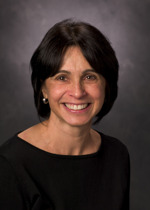The Strategies of a Successful Transposable Element
Susan Wessler
Thursday, 16 Oct 2014 at 4:00 pm – Sun Room, Memorial Union
A reception will precede the lecture at 3:30 pm.Susan Wessler is the University of California President's Chair and Distinguished Professor of Genetics at the University of California Riverside and home secretary of the National Academy of Sciences. She is a molecular geneticist known for her contributions to the field of transposon biology, specifically on the roles of plant transposable elements in gene and genome evolution. Her laboratory has pioneered the use of computational and experimental analyses in the identification of actively transposing elements. Wessler is coauthor of the widely used genetics textbook Introduction to Genetic Analysis and the popular reference book The Mutants of Maize. Women in STEM Series
Wessler earned her PhD in biochemistry from Cornell University and was a postdoctoral fellow of the American Cancer Society at the Carnegie Institution of Washington prior to starting her academic career at the University of Georgia. She joined the faculty at the University of California, Riverside, in 2010.
Cosponsored By:
- Agronomy
- Presidential Distinguished Seminar Program
- Committee on Lectures (funded by Student Government)
Stay for the entire event, including the brief question-and-answer session that follows the formal presentation. Most events run 75 minutes.
Sign-ins are after the event concludes. For lectures in the Memorial Union, go to the information desk in the Main Lounge. In other academic buildings, look for signage outside the auditorium.
Lecture Etiquette
- Stay for the entire lecture and the brief audience Q&A. If a student needs to leave early, he or she should sit near the back and exit discreetly.
- Do not bring food or uncovered drinks into the lecture.
- Check with Lectures staff before taking photographs or recording any portion of the event. There are often restrictions. Cell phones, tablets and laptops may be used to take notes or for class assignments.
- Keep questions or comments brief and concise to allow as many as possible.



